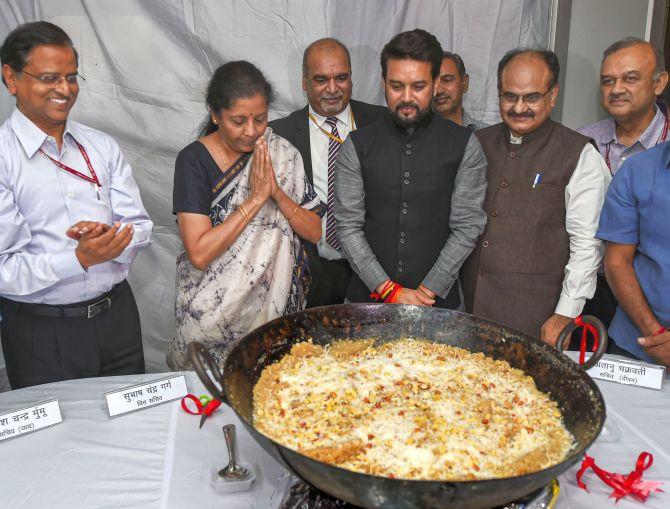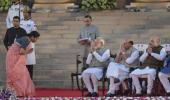'The fiscal situation is stressed (when is it not?!), economic growth has slowed, tax revenue has fallen short and the deficit is high if it is properly accounted,' points out T N Ninan.

The finance minister is holding pre-Budget meetings with specific groups.
Invitees proffer dozens of ideas at such meetings, from good to bad and positively zany.
Inevitably, therefore, very few of the suggestions aired at such meetings make their way into any Budget.
But finance ministers can and do get influenced by the kind of issues that are raised, since they are seen to indicate what people in general are concerned about -- whether inflation or the deficit, or economic growth.
This time may be no different.
The fiscal situation is stressed (when is it not?!), economic growth has slowed, tax revenue has fallen short and the deficit is high if it is properly accounted.
Government debt too is about 20% higher than it should be, and fresh borrowing is swallowing up almost all of household savings (partly because these savings have shrunk).
Almost no household savings are therefore available to the private sector.
Naturally, the Reserve Bank finds it difficult to force down interest rates in the market.
On account of both the shortage of funds as well as their cost, investment has suffered.
The average rate of inflation has come down over the years from 7% to 3%, but savings schemes like the provident funds continue to offer zero-risk, tax-free returns of more than 8%.
This is ridiculously high and out of line with the money market.
Naturally, real lending rates (after adjustment for inflation) are also among the highest in the world.
If the government wants interest rates to fall and facilitate private investment, among the things it has to do is remove tax incentives on small savings.
On the spending side, it should be doing as little as possible.
Neither bit of advice is what a newly elected government, with a massive mandate and promises to keep, wants to hear.
Compared to last year, new or larger commitments for this year already include the cost of Ayushman Bharat and the Rs 6,000 annual payout to all farmers -- at a time when tax revenue is well short of the Budget numbers.
Defence spending has been squeezed over the years and, as the finance minister would know from her previous perch in the defence ministry, the forces make do with lots of obsolete equipment.
Further neglect could prove costly.
Then, various unpaid bills from last year have to be paid.
The approach to the expenditure side of the Budget, therefore, has to be one of extreme moderation.
Any new or additional expenditure must be limited to the extent of matching savings under other heads.
Such savings are always possible.
On the revenue side, the room for raising fresh taxes is limited in a slowing economy.
The hard fact is that there is no fiscal space for the finance minister to manoeuvre -- other than what will become available from the Reserve Bank through transfer of what is deemed to be its excess reserves.
Given that the financial sector's troubles continue to impact economic activity, and the cleaning up of balance sheets is still a work in progress, the RBI windfall should be used to re-capitalise government-owned banks, and/or provide a special finance window for otherwise sound shadow banks that face liquidity problems because their existing sources of funding have dried up.
The best strategy would be for the minister to state the reality upfront (honest acceptance of the facts can be reassuring).
She should make clear that she is playing a five-year Test match, not a one-day event.
Her focus, therefore, should be on restoring fiscal sanctity and control (which financial markets will welcome), while energising her audience with reform policy initiatives for the long term.
The subsidy bill can be tamed by reforming the public food procurement system; there is no need for an expensive buffer stock when each year delivers a grain surplus.
And infrastructure investment can be funded by hawking existing assets (roads, discoms, etc) to long-term investors in operation and maintenance contracts, and using the money thus garnered to create new assets where the initial project risk is assumed by the government.












 © 2025
© 2025